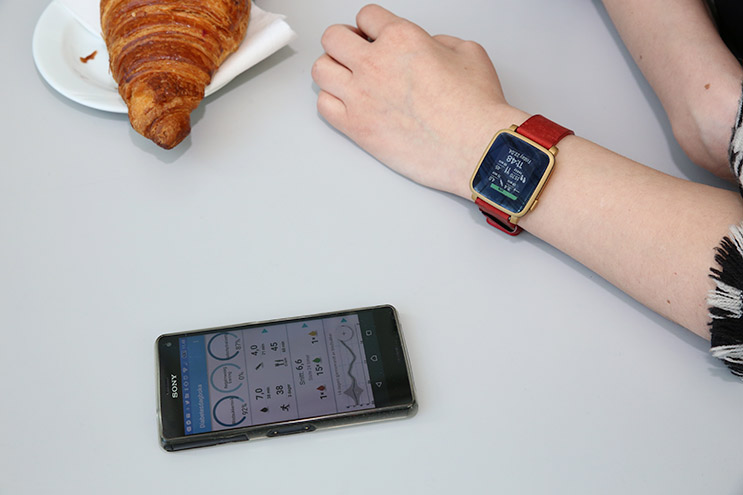Fact sheet 04-2016
Wearable technologies and Sensors
Downloadable PDF
Wearable technology
Smartwatches are becoming a widely adopted piece of wearable technology. For example, diabetes applications are more commonly supporting synchronization of data between smartwatches and smartphones, e.g. [1-3]. The most important features for using a smartwatch app for diabetes self-management are:
- Quick registration, access and review of health parameters (medication, nutrition, health parameters)
- Automatic physical activity tracking
- Providing reminders to measure blood glucose or enter other health parameters
Video demonstrating how to record vital diabetes data through a smartwatch application:
Sensors
Medical sensors are becoming smaller and are often equipped with wireless communication (e.g. FreeStyle Libre, Dexcom G5, Bragi Dash earphones). And despite high costs for use, continuous glucose monitors (CGM), for example, are gaining popularity. However, the future impacts both to patient health and health expenses, has not yet been calculated nor factored into health and care sector planning. Also, the border between fitness products and patient products is becoming fuzzier, due to the increased quality of fitness apps and sensors and their relevance to disease-specific areas.

The first implantable glucose sensor is about to be tested in Norway, the Eversense from Senseonics [4]. People can already buy implantable NFC-tags for access control, (health) information storage, payment, etc. Health care personnel are reluctant to perform implantations of most sensors, which limits the options for potential users.
In addition to sensors, medication dosing systems are more commonly launched with embedded wireless communication, e.g. the Bluetooth insulin pens ESYSTA [5] and InPen [6], and pill dispensers, e.g. the RxPense [7].
References
- Årsand, E., M. Muzny, M. Bradway, J. Muzik, og G. Hartvigsen, Performance of the First Combined Smartwatch and Smartphone Diabetes Diary Application Study. Journal of Diabetes Science and Technology, 2015: s. 1-8.
- Jovanov, E. Preliminary analysis of the use of smartwatches for longitudinal health monitoring. in 37th Annual International Conference of the IEEE. 2015. IEEE Xplore.
- Dibia, V. FOQUS: A Smartwatch Application for Individuals with ADHD and Mental Health Challenges. in Proceedings of the 18th International ACM SIGACCESS Conference on Computers and Accessibility. 2016. ACM.
- Senseonics. Senseonics, Evensense - Designed to be the first and only CGM with an implantable sensor that lasts up to 90 days. 2016 [sitert 2016, 8. Nov.]; Tilgjengelig fra: http://www.senseonics.com.
- GmbH, E. ESYSTA Insulin pen. 2016 [sitert 2016, 8. Nov.]; Tilgjengelig fra: https://www.emperra.com/the-pr...
- Companion Medical. The InPen™ smart insulin delivery system. [sitert 2016, 8. Nov.]; Tilgjengelig fra: http://www.companion-medical.com/products.html.
- Medipense Inc. RxPense “The intelligent medication management, dispensing and remote monitoring solution”. 2016 [sitert 2016, 8. Nov.]; Tilgjengelig fra: http://www.medipense.com/en/